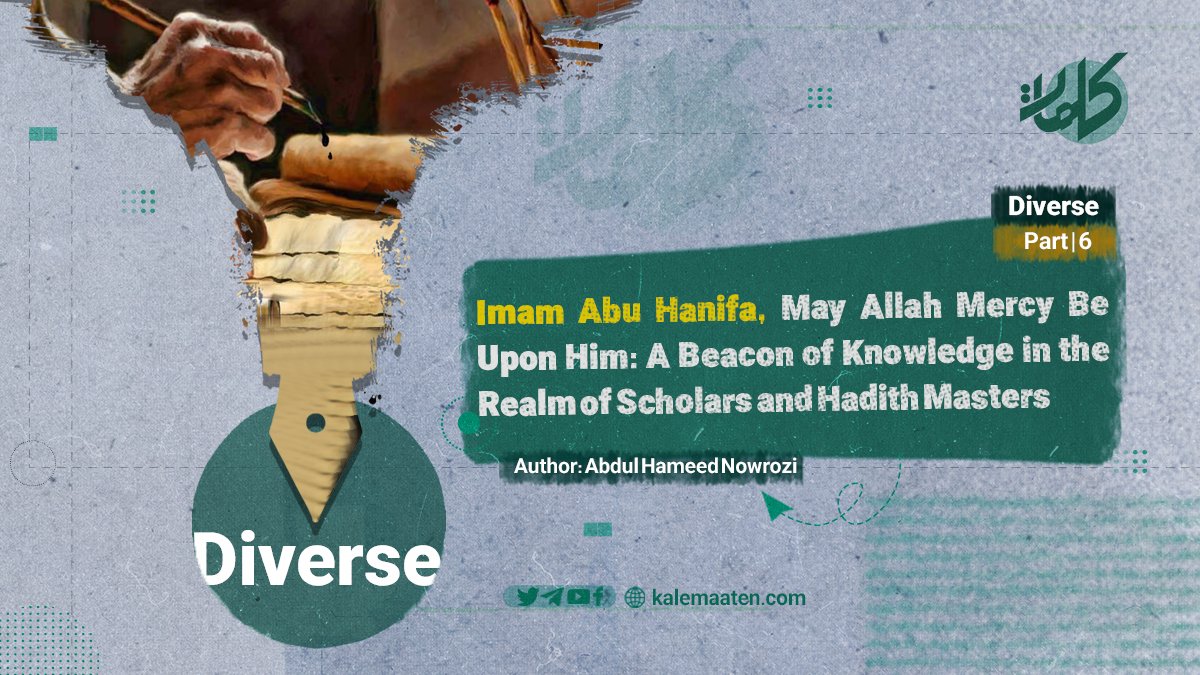
Author: Abdul Hameed Nowrozi
Imam Abu Hanifa, May Allah Mercy be Upon Him: A Beacon of Knowledge in the Realm of Scholars and Hadith Masters (Part 6)
Imam Abu Hanifa: The Acquisition of Knowledge
Imam Abu Hanifa, may Allah have mercy on him, was brought up in Kufa, which witnessed a great deal of scientific effort and activity at the time. Therefore, it was natural for the brilliant Abu Hanifa, with his exceptional understanding, to turn toward acquiring knowledge. It has been said that he first started with the science of Arabic syntax. The science of syntax fundamentally consists of solid rules and explicit words, where there is little room for differences of thought and interpretation. However, Abu Hanifa was a man who preferred to exercise his intellect and opinions. According to this spirit, he attempted to pluralize the word “kalb” to “koloub,” akin to the plural of “qalb” being “qoloub.” He was told that the correct plural of “kalb” should be “koloub,” which frustrated him. Consequently, he abandoned the science of syntax, which did not accommodate analogy, and began teaching the science of jurisprudence, where the use of analogy satisfied his intellect. Those who have narrated this incident imply that Abu Hanifa had a predilection for reasoning, analogy, and rationalism from the very beginning of his scholarly journey.
In addition to his work in jurisprudence, Abu Hanifa also studied theology and conducted research in that field, authoring works such as “Al-Fiqah al-Akbar,” a response to the Qadriyyah, and “Al-Alim wal-Muta’allim,” which is his letter to “Basti.”
Regarding why Imam Abu Hanifa, may Allah have mercy on him, pursued knowledge, it has been narrated that one day he passed by the esteemed scholar Al-Sha’abi. Al-Sha’abi invited him to sit and converse. He then asked Abu Hanifa with whom he was studying. Abu Hanifa replied that he was going to the market. Al-Sha’abi clarified that he meant which scholar Abu Hanifa would acquire knowledge from, not that he was going to the market. Abu Hanifa admitted that he seldom visited scholars, but Al-Sha’abi encouraged him, saying, “Do not do this; instead, go and acquire knowledge and thoughts, and associate with scholars,” as he noticed the intelligence, alertness, activity, and eagerness in Abu Hanifa.
This advice from Al-Sha’abi profoundly impacted Abu Hanifa’s heart, leading him to commence his studies.
Imam Abu Hanifa in the Presence of His Teacher Hammad
Imam Abu Hanifa, may Allah have mercy on him, studied under one of the prominent scholars of his time, Hammad bin Abi Sulaiman. He completed his jurisprudential studies with him, benefiting from his teachings for eighteen years until Hammad’s death.
Imam Abu Hanifa himself remarks: “After I assisted Hammad for twenty years, I felt a conflict within regarding leadership. I decided to withdraw and establish my own study circle. With this thought in mind, I left home one night to pursue this decision. However, when I entered the mosque and saw him, I lost the desire to leave and sat in his class instead. On that same night, I received news of the death of one of his relatives in Basra, who left no heir except for him. Hammad instructed me to take his place. Eventually, he left the city, and during his absence, I was presented with some questions I had never heard from him before. I answered them and recorded my responses. Upon Hammad’s return, I showed him the problems—approximately sixty questions. He approved my answers in forty cases and disagreed in twenty. I then vowed to myself that I would not leave him until he was no longer alive, and I fulfilled that commitment.”
Continues…


